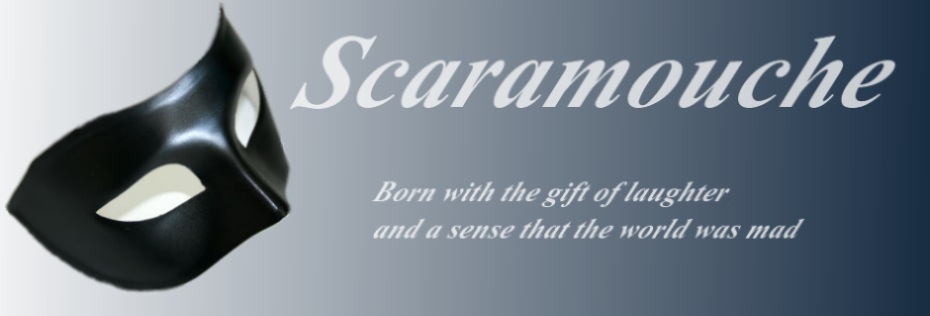“But Islam is not a threat to the West. The popular revolutions sweeping the Middle East are not against the West but, in fact, influenced by the concept of freedom, egalitarianism, justice, rule of law. The West should be happy that it’s the western values that are winning. People are not shouting Islamic slogans, they are shouting western slogans. So, why’s the West afraid? Because it is not honest.”
Or it is nervous that the democratic movement “mobilizing Muslims to liberate themselves from western-supported dictators and from foreign domination would also encourage the Palestinian movement to end the Israeli occupation.”
Or the West simply does not savour the prospect of “dealing with our countries as equals, with respect, equality and justice — which means they will have to give up their colonial and crusader mentality.”Has the future arrived? It sure has. And it's being ushered in by infidels who, even as we speak, are putting their lives on the line to "free" the people of Libya from their tyrant (so he can be replaced by the tyranny of sharia ?).
Another group that needs adjusting is the westernized elite in Muslim nations, especially in Tunisia, he said. They are alienated from their own people. They are anti-religious, whereas the people are not. Muslims have a right to be Muslim in a democracy.
Gannoushi was here to address a conference titled, “The Arab world in transition: Has the future arrived?”
If that's "hypocritical" or indicative of a "crusader mentality," then Harpoon Siddiqui buys Israel Bonds.
Update: Here's the "patient and polite" one (a "liberal Islamist," supposedly) writing on Muslim Brotherhood site. Marvel at the way he sucks up to the Bro's spiritual leader (odd behaviour for a "liberal") and even as he suggests Islamist "freedom-lovers" try a slightly different tack (essentially, accentuate sharia's positives/de-emphasize its negatives):
...Till our present day, there are still some Islamic groups that consider democracy to be un-Islamic, and maintain the hatred of freedom as their tradition. They argue that 'there is no freedom in Islam' and claim that freedom is restricted by the rulings of Shari`ah (Islamic Law). This would make Islam a dreadful contrast to freedom, and takes place at a time when Muslim people are suffering from despotism to the extent that Sheikh Yusuf Al-Qaradawi, the leading figure of Islamic moderation, gives priority to the requirement of freedom over the application of Shari`ah. In his book "Min Fiqh Ad-Dawlah Fil Islam" [Fiqh of the State in Islam], Al-Qaradawi states, "The first battle of the Islamic awakening and the Islamic movement in our time is the battle for freedom. All sincere Muslims must unite to call for freedom and defend it, as it is indispensable and has no substitute."
Sheikh Al-Qaradawi is in no need of being reminded, since he is more knowledgeable on this issue, that freedom is one of the main objectives of Shari`ah. However, Al-Qaradawi addresses the audience of the Islamic movement who have come to understand Shari`ah as a group of warnings, punishments, and restrictions on freedom. Hence, he addressed them in a language they can comprehend. This means that the culture of freedom needs to be deepened and propagated.
The general tendency among the Islamic movement is to rush to embrace democracy, taking part in it when the despotic powers give them some space to do so. The bitter experiences that the Islamic movement underwent at the hands of despotic powers may be the greatest motivation for this engagement in a way that makes practice come before theory, as the progression of theoretical conviction proceeds slowly.In other words, power to the people; the people who heed sharia, which is "freedom."
However, the main problem at the present time does not lie in convincing Islamists about democracy, but in convincing despotic leaders. In most cases, this act is looked upon as a violation of the common norm to the extent that military rulers, who have no roots in their societies, frequently boast that they do not recognize Islamic movements, while these movements have large numbers of followers everywhere and were established even before these military rulers were born. There is no justification for this act except the logic of despotism and their feeling of personal ownership of the state and society.
Undoubtedly, current regimes and the international powers that support them remain the main obstacles to the yearnings of our Muslim Ummah to attain freedom and take part in the positive democratic trend which is spreading throughout the whole world today, with the exception of Arab countries. Some aspects of the Islamic discourse presented by the moderate Islamic movement - which is the core of our interest in this regard for it is the principal body of contemporary Islam upon which we pin our hopes - are still hesitant to proceed with freedom and democracy to the end, to say nothing of extremist movements. In addition, they are hesitant to entrust believers with complete confidence in connecting the destiny of the Islamic project with their consciousness and admitting that they are the sole possessors and source of power, instead of suspecting them, taking guardianship over them, and feeling fear for the Islamic project from them.
Update: Gannoushi was once considered for the Ikwan's top spot, but decided that overseeing the Islamic "renaissance" in Tunisia was enough for him.
Update: Who wrote Gannoushi's Wiki entry (in which there's nada about his "renaissance" party being the Tunisian branch of the Muslim Brotherhood)--Harpoon Siddiqui?

1 comment:
Dateline: Doha Qatar
... looks like the Toronto Crescent's resident Jihad Monkey Boy Emeritus Haroon, is doing his monkey-n-cup routine again to get some petro-cash quick, before Torstar's stock collapses completely.
I'll give 5 to 1 odds that The Toronto Star will be Al Jazeera's first international print publication.
Post a Comment